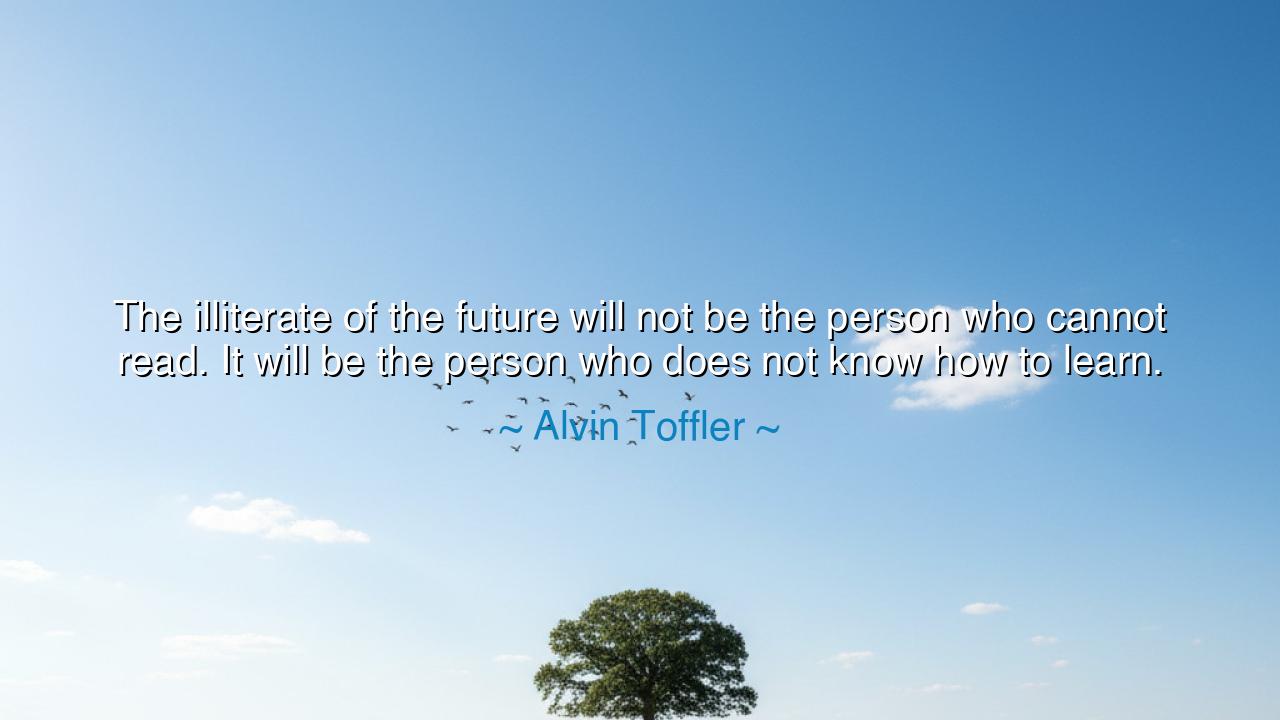
The illiterate of the future will not be the person who cannot
The illiterate of the future will not be the person who cannot read. It will be the person who does not know how to learn.






"The illiterate of the future will not be the person who cannot read. It will be the person who does not know how to learn." These profound words by Alvin Toffler cut to the heart of the modern world’s challenge: the ability to adapt, to learn, and to thrive in an ever-changing environment. Toffler’s insight reveals a fundamental shift in the nature of illiteracy. In the past, illiteracy meant the inability to read and write, a lack of access to basic knowledge. But in today’s world, knowledge is abundant, and the true challenge lies not in the ability to acquire information, but in the ability to process, understand, and apply that information effectively. The true illiterate of the future will not be the person who cannot read, but the person who lacks the tools to learn and adapt in an ever-evolving world.
In the ancient world, knowledge was often a privilege available only to the few. Plato, for example, taught that wisdom was not easily attained. In his Allegory of the Cave, he depicted people trapped in shadows, unable to see the world for what it truly was. Their ignorance was not a lack of knowledge, but a failure to learn, to escape the confines of their limited perceptions. The philosopher-king, in Plato’s ideal society, was the person who sought truth and wisdom, who did not merely accept the shadows of knowledge, but sought the light of true understanding. This resonates deeply with Toffler’s quote: the illiterate of the future are those who fail to seek out truth, those who remain confined in the darkness of unquestioned beliefs, unable or unwilling to learn and evolve.
Consider the story of Socrates, whose method of learning was based on questioning and dialogue. Rather than simply imparting knowledge, he encouraged his followers to engage in the pursuit of knowledge themselves. He did not give them answers; he gave them the tools to ask the right questions. This was the essence of his philosophical method—the Socratic method—which was not about memorizing facts, but about learning how to think, how to approach problems, and how to continually seek wisdom. In this sense, Socrates was a teacher not of information, but of learning itself. The ability to ask questions, to challenge assumptions, and to engage in self-reflection was the key to wisdom, and this is exactly the kind of learning that Toffler envisions as essential for the future.
The wisdom of Leonardo da Vinci, too, exemplifies Toffler’s vision of the future learner. Da Vinci was not merely a brilliant painter, but an unrelenting seeker of knowledge. He mastered many disciplines—art, science, engineering, anatomy—not by memorizing existing information, but by engaging deeply with the world around him, by asking questions and seeking to understand the principles that governed nature. Da Vinci’s learning was not passive; it was active, dynamic, and rooted in a curiosity that never ceased. He embodies the kind of learner Toffler describes—one who constantly seeks to grow and adapt, who does not accept the world as it is but strives to transform it.
In the modern world, the digital revolution has democratized knowledge, making it accessible to anyone with an internet connection. Yet, as Toffler points out, having access to knowledge is not enough. Learning today requires new skills—skills in critical thinking, in sifting through vast amounts of information, in discernment, and in the ability to adapt. The ability to learn quickly and efficiently, to separate fact from fiction, and to apply knowledge in creative ways is the true marker of intelligence in our time. The ability to learn is not merely about acquiring data, but about having the tools to navigate a world that is constantly shifting. Toffler foresaw a future where the true challenge would lie in our ability to keep learning, to stay curious, and to adapt to the changing world.
The lesson Toffler imparts is not just a call to value education, but a deeper, more profound reminder that learning itself is the key to survival and success in an ever-changing world. Knowledge is not static; it is a dynamic, ever-evolving process. The illiterate of the future will not be those who lack access to books or schools, but those who lack the ability and will to learn in a world full of rapidly changing technology, new ideas, and shifting social landscapes. Just as Socrates taught that the key to wisdom lies not in the answers, but in the questions, so too must we focus on how we learn, not just what we know.
In practical terms, this means that we must cultivate a love of learning, not just in ourselves, but in the generations to come. We must teach not only facts, but how to think critically, how to adapt, and how to seek understanding. We must encourage a mindset that is open to change, that is curious and engaged with the world, and that is resilient in the face of uncertainty. The future will not be shaped by those who can recite facts, but by those who can navigate the unknown, learn from it, and use it to create new possibilities. Let us, then, be learners in the truest sense—constantly evolving, constantly seeking, and always adapting to the world around us.






AAdministratorAdministrator
Welcome, honored guests. Please leave a comment, we will respond soon